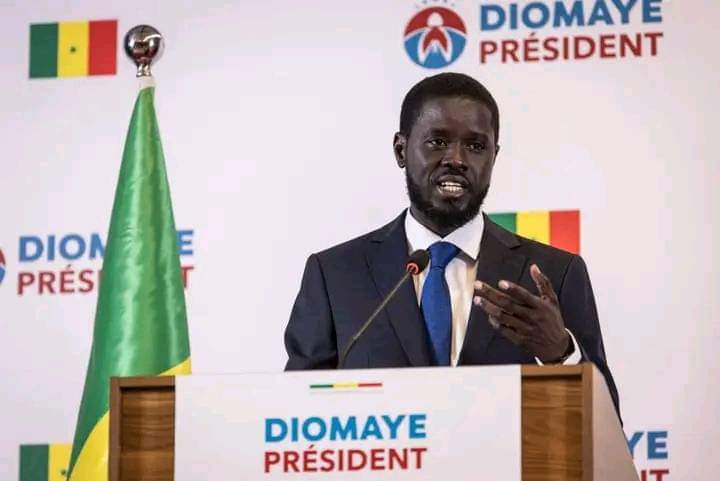Won by 829,665 vote margin… how 44-year-old Faye became Senegal’s president

In a stunning victory, opposition candidate Bassirou Diomaye Faye has emerged victorious in the Senegal’s presidential election held on March 24th, securing an impressive 54.28% of the total votes cast.
Faye’s remarkable achievement is underscored by the fact that he garnered a staggering 2,434,751 votes, signifying a significant mandate from the electorate.
His closest rival, former Prime Minister Amadou Ba of the ruling coalition, managed to secure 1,605,086 votes, representing 35.79% of the total votes.
The turnout for the Sunday presidential election was robust, with a notable 61% of eligible voters exercising their democratic right.
However, the electoral process was not without its challenges, as President Macky Sall had attempted to postpone the polls initially slated for February. His actions led to unrest and violent protests, tragically resulting in three fatalities.
Despite these obstacles, Faye’s resounding victory signals a new chapter in the political landscape of the nation, with hopes for stability and progress under his leadership.
From prison to become the youngest democratically elected president of Africa
Faye’s extraordinary rise in Senegalese politics caught many people by surprise.
He had been in jail for months alongside his ally and kingmaker, Ousmane Sonko, but they were suddenly released from prison the week before the presidential election.
Now known as Mr. Clean, he must begin work on the sweeping reforms he promised.
“Methodical” and “modest” are words often used to describe the tax collector, who celebrated his 44th birthday on Monday.
Mr. Faye fondly remembers his rural upbringing in Ndiaganiao, where he says he would go to work the land every Sunday.
His love and respect for village life are matched by his deep distrust of Senegal’s elites and establishment politics.
“He has never been a minister before and he is not a statesman, so critics question his lack of experience,” analyst Alioune Tine told the BBC. “But from Faye’s point of view, the insiders who have been running the country since 1960 have made some terrible failures.”
Fighting poverty, injustice, and corruption is at the top of Mr. Faye’s agenda. While still working for the Treasury, he and Ousmane Sonko created a union task force to tackle corruption.
Gas, oil, fishing, and defense deals must all be negotiated to better serve the Senegalese people, Mr. Faye says.
The president-elect of Senegal has said he will drop the much-criticized CFA franc currency, which is pegged to the euro and supported by former colonial power France.
Mr. Faye wants to replace it with a new Senegalese or regional West African currency, although this will not be easy.
How Bassirou become candidate
They announced Bassirou Diomaye Faye in February as the so-called “Plan B” candidate, replacing the charismatic opposition figure Ousmane Sonko. “I would even say he has more integrity than me,” Mr. Sonko proudly stated.
READ ALSO: Senegal’s Bassirou Diomaye Faye: Meet Africa’s youngest elected president
Both men established the now-disbanded Pastef party, both were tax collectors, and both found themselves jailed last year on charges deemed politically motivated.
They convicted Mr. Sonko of two offenses, which meant barring him from the election, so Mr. Faye stepped in.
“Bassirou is me,” Mr. Sonko recently told supporters. “It’s two sides of the same coin,” agreed Pastef colleague Moustapha Sarré.
This has led to criticism that Mr. Faye is merely a “president by default.”
Not so, said analyst Mr. Tine. But their relationship could usher in a new style of leadership.
“Maybe they will establish a tandem and break away from the hyper-presidential model of having an all-powerful head of state.
“Sonko is the uncontested leader of Pastef – an icon, even… [But] the two have [a dynamic of] complicity and collusion.”
Once upon a time, Mr. Faye wanted nothing to do with politics. “It never crossed my mind,” he said in 2019 when recalling his childhood.
One of Mr. Faye’s heroes is the late Senegalese historian Cheikh Anta Diop – whose work is seen as a precursor to Afrocentrism. They are seen as left-wing champions of pan-Africanism.
As early results came in on Monday showing Mr. Faye set for victory, people in the capital, Dakar, celebrated by blowing car horns and singing to loud music.
The reaction from international markets was less jubilant, as Senegal dollar bonds fell to their lowest level in five months. Reuters news agency reported that investors were concerned Mr. Faye’s presidency may wind down the country’s business-friendly policies.
The election was supposed to be held last month but Mr. Sall postponed it just hours before the campaign was to begin, triggering deadly opposition protests and a democratic crisis.
Most candidates had very little time to prepare once the new election date was set – but Mr. Faye had just over a week after his release from jail.
Despite the shortened campaign period, Senegalese citizens are determined to turn out and use their vote, Christopher Fomunyoh of the National Democratic Institute for International Affairs told BBC.
“Senegal is in the process of confirming that democracies can self-correct and emerge stronger and more resilient.”
And the true test for Senegal’s clean-up guy has just begun.

